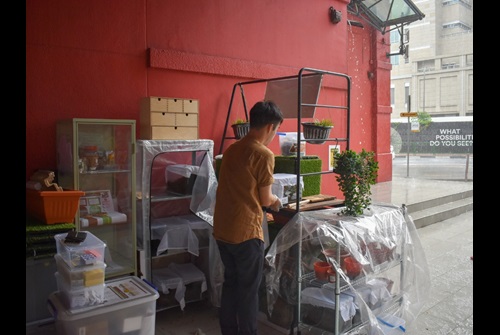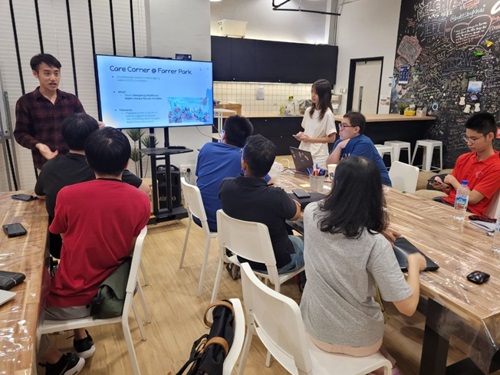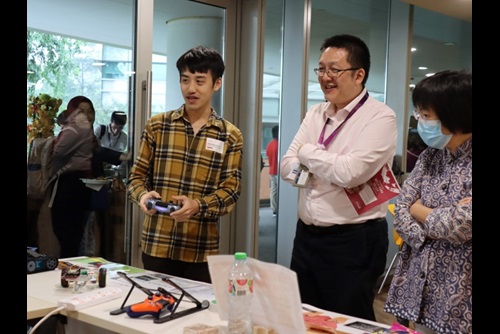"Would you still love me if I was a worm?" If you’re a composting worm, a regenerative garden located at Youth Corps Singapore would.
Started by 26-year-old Willoughby Niki Lee, the garden is part of his efforts to connect youth volunteers with seniors through vermicomposting—the processing of organic wastes through earthworms. It houses tanks of vermicompost where seniors and young people come together to feed the worms waste like coffee grounds, dried leaves, and vegetable scraps.
While the usage of the space at The Red Box only started earlier this year, it has been an ongoing effort since 2019.

The Regenerative Garden offers seniors such as gardening enthusiasts and retired engineers micro jobs. Photo credit: Amanda Tan
He became a volunteer in 2018 with Youth Corps’ Eldercare Cluster—a group of youths passionate about sustaining positive change in the eldercare landscape. Subsequently, Niki founded TinkerThings. It is an initiative that focuses on digital literacy workshops, intergenerational gardening, and technology-enhanced activities.
At the time, Niki was exploring the best ways to engage seniors and foster meaningful connections between them and the younger generation. He landed on sustainability activities as a way to encourage seniors to step out of their homes more often. After consulting both age groups and understanding their interests, he decided to focus on composting. During the first run, he held the composting workshops at public spaces in residential areas. He recounts, “I think what was interesting was some of them mentioned that that was the first time they actually met this neighbour [or] that neighbour.”
Subsequently, in 2024, TinkerThings also became a highest tier grant awardee of the Youth Action Challenge (YAC) Season 5.
It’s been seven years since Niki first joined Youth Corps, but his journey toward building stronger intergenerational connections began much earlier. Living with his grandparents, Niki always had a bond with the older generation.
"There are (also) some uncles and aunties in the (MacPherson) community who have sort of seen me grow up. Because I've known them for a while, there really was that interest to engage with them to break the stigmas or any kind of stereotypes that youths, including myself, might have about seniors—like they’re slower, less engaged, or resistant to technology," Niki shares.
Recognising that language is one that bridges people and breaks down potential walls of unfamiliarity, he made efforts to learn dialects, such as Hokkien, Teochew, and Cantonese with help from seniors whom he dubs as the “best teachers”.
With a stake in the welfare of the MacPherson seniors, when Youth Corps Service Week in 2018 rolled around, Niki and his friends jumped at the chance to utilise the grant and start a meaningful initiative for the elders. Noticing that many elderly men were less inclined to visit ageing centres for social activities, they decided to host an intergenerational carnival to reach out to those who were more isolated. He recalls, “It was a good experience to be involved in the community through understanding what brings people together and how very organic interactions can happen when you don't put too much structure in an activity.”
Following the success of the carnival, Niki was extended an invitation by a Youth Corps staff to join the Eldercare Cluster, and he readily agreed. “Because volunteering to me before this experience was based on serendipity. (It was) very one-off…I was always interested to find out more or learn more about what's next so I think (joining) the cluster was the next (natural) step for me.”
Prior to joining Youth Corps, Niki's approach to volunteering was largely exploratory. During his junior college days, he was exposed to various social topics through subjects like Project Work (PW) and General Paper (GP). For him, the most effective way to understand these topics was by stepping out of the classroom and immersing himself in real-world experiences through volunteering.

Niki credits much of his growth in the cluster to Rosie Sim, Assistant Director of Youth Corps and Cluster Lead of the Eldercare Cluster, who gave him opportunities to understand the motivations of youth and volunteering. Photo credit: Willoughby Niki Lee
Volunteering was also a natural progression from his academic interests. While completing his undergraduate studies at the National University of Singapore (NUS), Niki participated in the Chua Thian Poh Community Leadership Centre (CTPCLC)'s certificate programme in community development.
As part of the programme, he worked on a research project involving homelessness in Singapore, specifically the Chinatown area where many seniors roam. The programme allowed him to synergise his volunteering activities with a deeper understanding of community dynamics.

In his years with CTPCLC, Niki worked closely with Alzheimer's Disease Association (ADA) on development projects in Kebun Baru. Photo credit: Willoughby Niki Lee
Niki’s role in the cluster has since evolved from volunteer to Project Director of the Awareness Division, where he plans activities. He also serves as a mentor to his fellow volunteers. He emphasises the importance of finding purpose in what one does, both for himself and the volunteers he leads.
"As youth, we are interested in a lot of things, but finding purpose in what you do is very important," he notes. "My role in leading teams or volunteers was to really understand their purpose and curate their experiences in a way that benefitted them but also allowed them to explore further."
He does so by conducting check-ins with the cluster members, identifying what skillsets they wish to build. “It's like an opportunity cost, right? They could be somewhere else doing something else,” says Niki, highlighting the need for purposeful engagement and retention of motivation.
As Niki continues his journey, he is setting his sights on further academic pursuits, including a potential PhD in public policy. While he is still in the process of curating a topic, he hopes to understand how trust-building can happen in a public, community space through a multidisciplinary and intergenerational approach. He says, "Ultimately, I want to create an organic but safe space for youth, adults, and seniors alike to be more engaged in community spaces."
“Singapore is a small place. We know that things are efficient and work well here…(I believe) Singapore can be known for more than just (that), but also the heart of what we do. I think that's something I aspire to work towards.”





